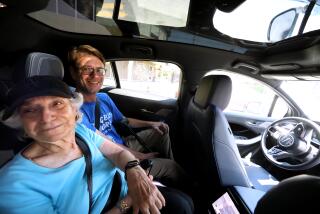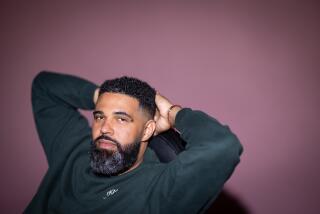He Saw a Need, Applied the Science
- Share via
Don Schoendorfer would have sworn pastor Kenton Beshore was talking directly to him that Sunday morning as he described “the fool’s game” to his large Mariners Church congregation in Irvine.
“He was saying it’s the fool who thinks he has to become independent and financially secure before he can actually do something good. And he’ll die the fool,” Schoendorfer recalls. “I realized that was me. I was playing the fool’s game.”
Schoendorfer was no fool. He was an MIT mechanical engineer. After college, he applied his training to the medical field and worked on things far over the heads of most of us.
But there was a part of him -- he says it began as a boyhood thought -- that wanted to do something for humanity. As he matured, he found himself asking what that something could be.
Years earlier, while traveling in Morocco, he saw something that stuck in his memory: a woman who crossed a dirt road, if that’s how you describe someone on her belly and using her fingernails for propulsion as her useless legs dragged behind.
It led Schoendorfer to think about wheelchairs and the need for them in parts of the world where people don’t have easy access to them.
Surely, he thought, he could design something. With Beshore’s sermon stoking pent-up thoughts, Schoendorfer started noodling in 1998. He went to the Tustin Market Place and bought some cheap lawn chairs and mountain bike tires.
Over the next several months, into 1999, about 100 wheelchairs -- nothing more than lawn chair seats with iron supports and mountain bike tires -- filled his North Tustin garage. His neighbors, used to him discussing Food and Drug Administration testing, wondered if he’d lost it. His daughters feared he would sell the house to finance the project. He and his wife, Laurie, went into debt, until she returned to work for the Social Security Administration.
Schoendorfer knew he wasn’t nutty. He was on a mission from God. “I realized it was not me doing this work. I realized I was being driven.”
Early in 2001, the break came. The church sponsored a medical mission to India, and Schoendorfer thought they could take 100 chairs with them. The group settled on four.
In the hot sun outside a clinic in Chennai, India, Schoendorfer found his first client -- a man carrying his 11-year-old son, who had cerebral palsy. Schoendorfer placed a chair near the man, who, after eyeing it, eased his son into it. Schoendorfer and those with him knew he wasn’t nutty after all.
Within three months, Schoendorfer had formed the nonprofit he still runs, Free Wheelchair Mission. Not far from the Tustin Market Place where it all began, the headquarters are in a Costa Mesa commercial park. Its two manufacturing plants are in Shanghai.
The numbers: Schoendorfer says he’s distributed 120,000 chairs since 2001. He wants to distribute 20 million by 2010.
He’s expecting $4 million in donations this year, after receiving $1.6 million last year. He has sent 5,000 chairs to Iraq since the war started, for civilian war victims and those with medical ailments.
Next week, on behalf of Free Wheelchair Mission, an Army colonel back from Iraq will visit donors in Orange County, as well as speak to groups in Washington, D.C., and at Schoendorfer’s boyhood church in Ashtabula, Ohio, which has generously contributed to his effort.
At his office Thursday, I ask Schoendorfer, 55, if he takes time to feel good about himself for making good on his boyhood notion to help.
He deflects that and says, “It’s very rewarding to see how it affects other people who are helping us. A lot of this isn’t just helping the poor. It’s helping the rich learn how to help the poor.” Some donors want to travel to places the chairs are going (now 50 countries), Schoendorfer says, “and when they do, they tend to come back as disciples, almost, truly committed volunteers.”
I ask what’s in the family garage now. “A car,” Schoendorfer says. “Can you believe it?”
*
Dana Parsons can be reached at (714) 966-7821 or at dana.parsons@latimes.com.
More to Read
Sign up for Essential California
The most important California stories and recommendations in your inbox every morning.
You may occasionally receive promotional content from the Los Angeles Times.













